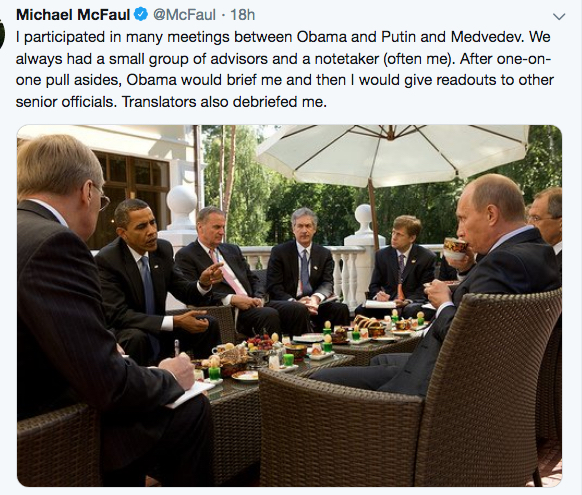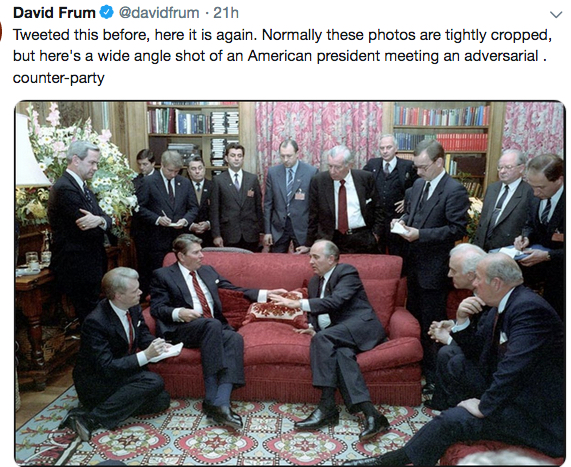A Possible Obstruction Case
Still another issue mentioned with some frequency were two potentially related texts:
“And we need to open the case we’ve been waiting on now while Andy is acting”; and
“We need to lock in [redacted] in a formal, chargeable, way.”
Again, Page confirms that “Andy” is indeed a reference to McCabe. Notably, that text was sent the day after Comey had been fired by Trump. Unfortunately, a certain level of clarity remains lacking as FBI counsel was limited to noting that “the decision to open the case was not about who was occupying the director’s chair.” She continued in a somewhat confusingly with, “if I was able to explain in more depth why the director firing precipitated this text, I would.”
One representative kept pursuing the question from multiple angles, asking, “Was that a fear that someone other than McCabe would eventually be put into that slot?” Page again consulted with counsel and noted she couldn’t answer that question.
The representative made the logical observation, “Well, that leads at least some of us to conclude that it may have been an obstruction-of-justice case.” Page responded, “That’s a reasonable inference, sir, but I cannot, sort of, confirm that that’s what we are referring to.”
The dialogue continued:
Unidentified Representative: “So the firing of Jim Comey was the precipitating event, as opposed to the occupant of the director’s office?”
Page: “Yes, that’s correct.”
Rep.: “Well, other than obstruction, what could it have been?”
Page: “I can’t answer that, sir. I’m sorry.”
Rep.: “Is there anything other than obstruction that it could have been?”
Page: “I can’t answer.”
Page maintained that the second text was a separate matter from the first—but time may have been a factor as it occurred in the days preceding Mueller’s appointment as special counsel. Page also claimed not to know exactly what it pertained to:
“My suspicion is, we have either been interviewing some witness or have been getting kind of closer to some target, either we’ve already had interviews or we haven’t.
“What this is suggesting is, like, we need to start thinking about locking in whomever in a way that might be able to support charges. … My suspicion is that we have somebody who we think is lying. … To the extent we want to be able to charge them for lying, we need to lock them in in a formal way, in a way in which we will be able to support those charges.”
The issue of obstruction came up several times, including a notable exchange that took place during the second day of testimony:
Unidentified Representative: “Were there discussions about opening an obstruction-of-justice case or any other case against Donald Trump prior to the firing of Jim Comey on May 9th of 2017, as reflected in the Comey memos?”
FBI legal counsel: “Congressman, to the extent that goes into the equities of the ongoing investigation that the special counsel is now conducting, I will instruct the witness not to answer.”
Normally, this line of questioning ends with inferences having to be made, but, in this case, what appears to be an honest error on the part of Page hinted firmly at the true answer:
Rep.: “I don’t want any of the details. I just want to know whether there was a discussion about the possibility of opening that prior to the firing of the director.”
Page: “Obstruction of justice was not a topic of conversation during the timeframe you have described.”
Rep.: “OK. Then—”
Page: “I think. One second, sir.”
[Discussion off the record.]
Page: “Sir, I need to—I need to take back my prior statement.”
Rep.: “Which one?”
Page: “Whatever the last thing I just said was. Sorry. That there were no discussions of obstruction, yeah. That is—I need to take that statement back.”
Rep.: “So there were?”
Page: “Well, I think that I can’t answer this question without getting into matters which are substantively before the special counsel at this time.”
Rep.: “Well, I think you’ve just answered it by not answering it. Was Andy McCabe privy to those same conversations?”
Page: “I can’t answer this substantively, sir. I’m sorry.”
Rep.: “Well, were these related to some charges, whether obstruction or other charges, potentially against Donald Trump?”
Page: “I can’t—I can’t answer that question, sir, without getting into the substance of matters that are now before the special counsel.”
Rep.: “Again, I think you’re answering it by not answering it.”
At a later point in testimony, this issue was potentially further clarified:
Rep.: “Comey has admitted that he told the president, I think, that he wasn’t under investigation during that timeframe.”
Page: “That is not inconsistent, sir. … Somebody could not be under investigation, but there still could be discussions about potential criminal activity, and that is totally consistent with FBI policies and would not be unusual with respect to any investigation.”
This provides a perfect explanation as to why Comey refused to tell the press that Trump wasn’t under investigation—and the nature of the text messages.
The FBI hadn’t placed Trump under any formal investigation—but they were keeping their ability to do so open, and Acting FBI Director McCabe may have been planning to initialize a formal investigation before a permanent director could be appointed.




 !
!
 Day 120
Day 120



